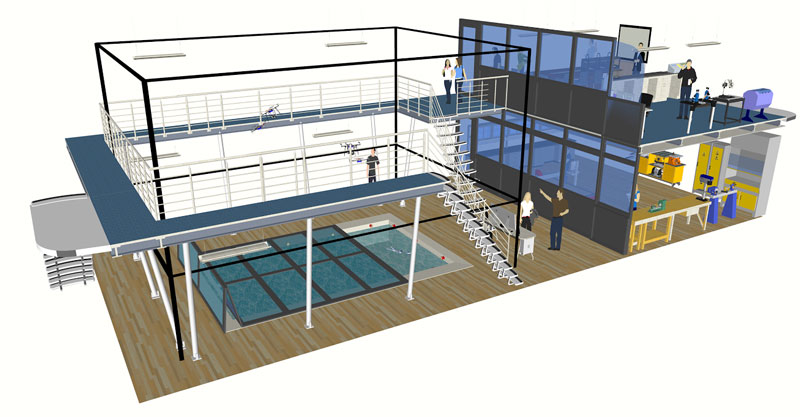
Robohub.org
£1.25M advanced drone lab gets the go ahead

Imperial College London (Rob Sidall)
Imperial College London today announced it is to develop the UK’s most advanced aerial robotics laboratory. The drone lab to be known as The Brahman Vasudevan Aerial Robotics lab will be two stories and constructed on the roof of the South Kensington Campus. The aim of this state-of-the-art laboratory is to become one of the UK’s leading centres for aerial robotics research and development. It is predicted that the global market value of unmanned aerial robot manufacturing is to reach an estimated $US 89 billion in the next ten years.
Mr Brahmal Vasudevan, an Imperial alumnus gifted the funds to build the facility. Dr Mirko Kovac, Director of the drone lab says:
Aerial robotics has the potential to become an important industry in the UK, but we need world beating teaching and research infrastructure to make this a reality. Thanks to the support of Mr Valsudevan we will now be able to construct an outstanding facility, which will enable the College to consolidate its position in this field and foster the next generation of engineers. Ultimately, we are aiming to develop flying robots that could improve the way companies do business, save lives and help to protect our environment.
So what can we expect from the drone lab? The centre has been designed with a focus on hybrid drones that can fly and dive into water. It will be equipped with sixteen high speed 3D aerial tracking cameras, and a further eight 3D tracking cameras will be positioned in a water tank. These cameras will be used to track and record the drones in real-time. The combination of cameras and a cloud based computer system will power the intelligence needed to control the drones with millisecond accuracy. Compare this to human piloted drones and the similarity can be compared to the eyes and brain of a human. These are crucial areas of research and development if you want to learn how to control fleets of drones simultaneously or want to automate routine operations.
This commitment of investment will bolster the UK to become a world leader in drones and autonomous systems. At Bookadrone we are very excited with this announcement. This centre for excellence will help accelerate the advancement of new hardware and software solutions – something that will help address safety concerns and short-term viability of the technology.
tags: drones





